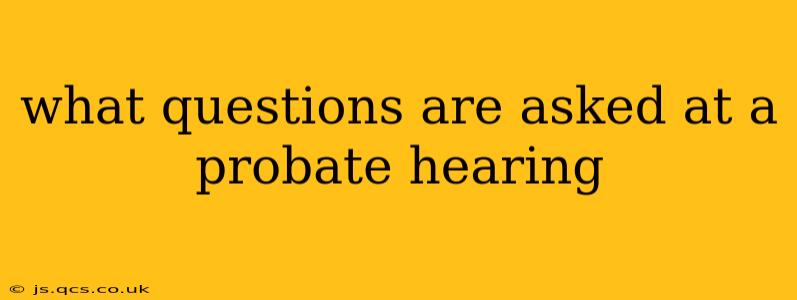What Questions Are Asked at a Probate Hearing? Navigating the Probate Process
Probate hearings can seem daunting, filled with legal jargon and complex procedures. Understanding what to expect, including the types of questions that might be asked, can significantly alleviate anxiety and help ensure a smoother process. The specific questions asked at a probate hearing will vary depending on the complexity of the estate and the specific issues being addressed. However, several common themes and question types emerge. This guide aims to shed light on these, equipping you with the knowledge to navigate this crucial legal step.
Key Considerations Before the Hearing:
Before diving into the potential questions, it's crucial to understand that probate hearings aren't typically about grilling witnesses. They're primarily focused on verifying information presented in the probate petition and ensuring the court has sufficient evidence to approve the process. Proper preparation, including gathering all necessary documentation and understanding your role in the proceedings, is paramount.
Questions Regarding the Will (if applicable):
-
Is this the deceased's valid Last Will and Testament? This is a fundamental question if a will exists. The court needs confirmation that the will is authentic, legally sound, and properly executed according to the relevant jurisdiction's laws. This might involve questions about the testator's capacity (mental competence) at the time of signing, the presence of witnesses, and whether any undue influence or coercion was exerted.
-
Who are the beneficiaries named in the will? The court needs to clearly identify who inherits assets under the will's provisions. This involves clarifying relationships to the deceased and ensuring the accuracy of names and contact information.
-
Are there any challenges to the validity of the will? The court must address any objections or contests filed against the will's legitimacy. This might involve questions related to potential fraud, forgery, or lack of testamentary capacity.
Questions Regarding the Estate Assets:
-
What assets are included in the estate? This involves a complete inventory of all assets, including real estate, bank accounts, investments, personal property, and any debts owed by the estate.
-
What is the estimated value of the estate? An accurate appraisal of the estate's assets is vital for determining inheritance taxes, distribution amounts, and potential creditor claims. The court might question the methods used for valuation.
-
Are there any outstanding debts or liabilities? The court needs to understand the financial health of the estate, including outstanding mortgages, loans, credit card debts, medical bills, and taxes. Addressing these debts is a crucial step in the probate process.
Questions Regarding the Executor/Administrator:
-
Are you the named executor/administrator? The court confirms the individual's legal authority to manage the estate. This includes verifying their identity and their acceptance of the role.
-
What is your plan for managing the estate's assets? The executor/administrator needs to outline their plan for handling the estate's finances, paying off debts, and distributing inheritances according to the will or intestacy laws. This might involve questions about their financial experience and their proposed timeline.
-
Do you have any conflicts of interest? The court needs to ensure the executor/administrator's impartiality and their ability to act in the best interests of the estate and its beneficiaries.
Questions About Beneficiaries:
-
Are all beneficiaries accounted for? The court needs to ensure all intended beneficiaries are identified and notified of the probate proceedings.
-
Do all beneficiaries agree with the proposed distribution? While not always mandatory, obtaining agreement from beneficiaries can streamline the process. The court may ask about any objections or disputes among heirs.
Addressing Unforeseen Circumstances:
- Are there any unforeseen complications or disputes? Probate hearings often uncover unexpected issues, such as missing wills, contested claims, or family disagreements. The court will address these matters to ensure a fair and equitable resolution.
Remember, this is not an exhaustive list, and the specific questions will depend on the unique circumstances of each case. Consulting with an experienced probate attorney is strongly recommended to ensure proper preparation and representation throughout the probate process. They can anticipate potential questions and help you respond appropriately, protecting your interests and ensuring a successful outcome.
